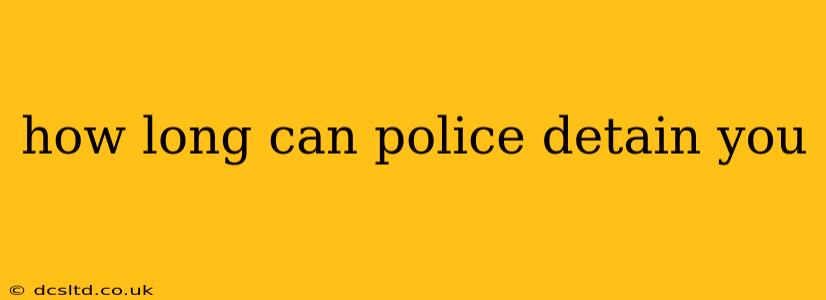The length of time police can detain you depends heavily on the circumstances and your location. There's no single, simple answer, as laws vary significantly between countries and even within different jurisdictions of the same country. This article will explore the various factors influencing how long police can legally detain someone, clarifying common misconceptions and emphasizing the importance of knowing your rights.
How Long Can Police Detain You for Questioning?
This depends entirely on the situation. In many jurisdictions, police can detain you for a reasonable period for questioning, but "reasonable" is subjective and depends on several factors:
- The Severity of the Suspicion: If police suspect you of a minor offense, the detention time for questioning will likely be shorter than if you're suspected of a serious crime like robbery or assault.
- The Availability of Evidence: If police have substantial evidence, they may detain you for a shorter time to gather further information. Conversely, if evidence is limited, the detention might be longer to allow for a thorough investigation.
- Cooperation with Police: If you cooperate fully and answer questions honestly, the detention may be shorter. Refusal to cooperate could extend the detention, although police still need probable cause to continue detaining you.
It's crucial to remember that you have the right to remain silent. Exercising this right doesn't mean you're guilty, but it protects you from inadvertently incriminating yourself.
What Happens After a Police Detention?
After a period of questioning, several scenarios can occur:
- Release without Charges: If police find insufficient evidence, they must release you.
- Arrest and Formal Charges: If police have enough evidence to believe you committed a crime, you'll be arrested and formally charged. This initiates the legal process, including the right to an attorney.
- Further Investigation and Bail: Depending on the severity of the alleged crime, you might be released on bail while the investigation continues. Bail conditions will vary depending on the jurisdiction and the specific offense.
Can Police Detain You Without Arresting You?
Yes, in many instances, police can detain you for investigation without formally arresting you. This is often referred to as a "stop and frisk" or "temporary detention." However, this detention must be justified by reasonable suspicion that you've committed, are committing, or are about to commit a crime. The police must also have a legitimate reason for the stop. The length of such detention should be brief and only long enough to investigate the initial suspicion.
How Long Can Police Detain You Before Charging You?
Again, this varies greatly. In many jurisdictions, there are time limits on how long someone can be detained before being charged or released. However, these limits can be extended under specific circumstances, such as obtaining a warrant or if the investigation is complex and requires more time. These limits often apply once a formal arrest has been made. Consult your local laws for specifics.
What Are My Rights During Police Detention?
Regardless of the reason for detention, you generally have several crucial rights:
- The Right to Remain Silent: You are not obligated to answer questions. Anything you say can be used against you in court.
- The Right to an Attorney: You have the right to contact an attorney and have them present during questioning.
- The Right to Know the Reason for Detention: Police must inform you of the reason for your detention.
What Should I Do If I Believe My Detention is Unlawful?
If you believe your detention is unlawful or excessive, seek legal advice immediately. You may also file a complaint with the relevant authorities, such as an internal affairs department or an oversight agency. Document the circumstances of your detention as accurately as possible.
Disclaimer: This information is for general knowledge only and does not constitute legal advice. Laws regarding police detention vary widely depending on location and specific circumstances. If you have questions about your rights during police detention, consult with a qualified legal professional in your jurisdiction.
